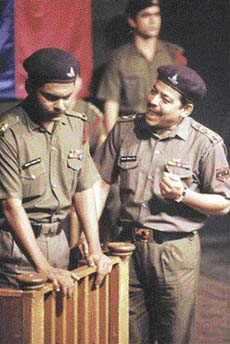 Swadesh Deepak’s 1970s play about caste in the army remains as searing as ever, finds Trisha Gupta
Swadesh Deepak’s 1970s play about caste in the army remains as searing as ever, finds Trisha GuptaIn the true tradition of the courtroom drama, the action of this now-classic play takes place almost entirely within four walls. The plot revolves around the trial of one Sawar Ramchandar, who is accused of having opened fire on two superior officers, Captains Kapoor and Varma. Only Kapoor survived and is now a witness in the court martial proceedings against Ramchandar.
The play opens with Ramchandar’s act of violence being treated by all concerned as unprovoked and inexplicable. Some time is spent on establishing that as the soldier on duty at the post, he could have – but had not – challenged the two senior officers in standard military fashion (by shouting out “Tham, kaun hai?”). Then the interrogation of the army doctor (a great potential cameo utterly wasted by Rahul Batra) brings to light a past incident when Ramchandar had reported sick, but been compelled to report for a hockey match based on Kapoor’s intervention (“These johnnies are always shamming”). Ramchandar had then collapsed on the field. As Bikash Rai, the righteous, sarcastic defence lawyer (decently played by Bajrang), begins to probe into these seemingly insignificant details, we are drawn deeper into the past relationship between Ramchandar and Kapoor, and an ugly tale of caste prejudice and violence emerges.
 Asmita’s production has many flaws – the long-winded opening monologue by Deepak Ochani as Colonel Surat Singh, for instance, is often unintelligible because he speaks much too fast, and the “flashback” sequences, which invariably involve a bunch of shouting men running onto stage, are markedly amateurish in execution. But Swadesh Deepak’s tightly-structured script is both important and courageous, because it manages to convey how caste prejudice still simmers just below the surface of relationships in contemporary urban India, and because it does so by setting the action in a context which is itself deeply hierarchical – that of the Indian army.
Asmita’s production has many flaws – the long-winded opening monologue by Deepak Ochani as Colonel Surat Singh, for instance, is often unintelligible because he speaks much too fast, and the “flashback” sequences, which invariably involve a bunch of shouting men running onto stage, are markedly amateurish in execution. But Swadesh Deepak’s tightly-structured script is both important and courageous, because it manages to convey how caste prejudice still simmers just below the surface of relationships in contemporary urban India, and because it does so by setting the action in a context which is itself deeply hierarchical – that of the Indian army.The only weak link in the script is the character of Captain Kapoor, who is shown as nothing short of a monster: apart from being feudal and unremittingly casteist, he’s also an alcoholic who beats his wife. Such overkill can only detract from the play’s effect. As with any villain, you stop perceiving him as a regular guy – which is unfortunate, because this play could have demonstrated precisely how regular people, in regular jobs, regularly treat other human beings as inferior on the basis of their birth. Court Martial overstates the case – then again, perhaps this is an issue that can do with reiteration.
Time Out Delhi, 2007
No comments:
Post a Comment